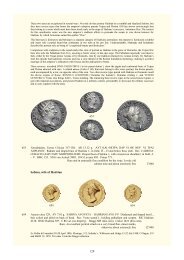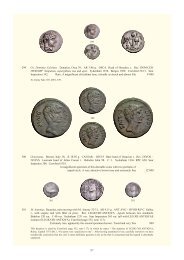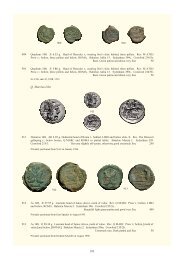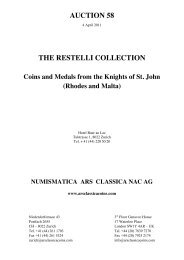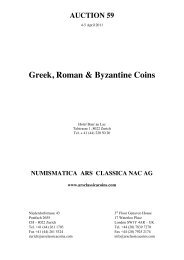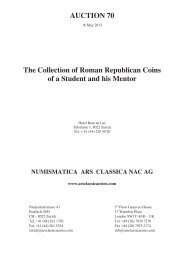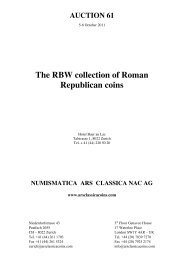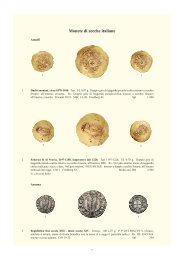The RBW collection of Roman Republican coins part II
The RBW collection of Roman Republican coins part II
The RBW collection of Roman Republican coins part II
Create successful ePaper yourself
Turn your PDF publications into a flip-book with our unique Google optimized e-Paper software.
Cnaeus Pompeius Magnus220220 Aureus 71, AV 8.91 g. MAGNVS Head <strong>of</strong> Africa right, wearing elephant's skin; on l., jug with handle to l.;on r., lituus. All within wreath. Rev. Pompey in triumphal quadriga r., holding branch in r. hand; on nearhorse, rider; above, flying Victory with wreath. In exergue, PRO·COS. Babelon Pompeia 6. Bahrfeldt 13a.Sydenham 1028. Calicó 35. Crawford 402/1a (obv.) and 402/1b (rev.).Of the highest rarity, only the fourth specimen known and the only one in private hands.An issue <strong>of</strong> great importance and fascination. Minor marks and two absolutelyunobtrusive metal flaws on reverse, otherwise about extremely fine 45’000Ex Triton sale <strong>II</strong>I, 1999, 817.<strong>The</strong> military talents <strong>of</strong> Pompey Magnus were apparent even as a 17-year-old when, starting in 89 B.C., he fought in theSocial War at the side <strong>of</strong> his father, Pompey Strabo. In his early 20s he secured Sicily on behalf <strong>of</strong> Rome before being sentto Africa by Sulla. In a difficult battle in 81, young Pompey defeated the Marian forces <strong>of</strong> Domitius Ahenobarbus and hisally, the Numidian King Hiarbas, for which he was hailed imperator by his troops. Upon returning to Rome, Pompey wasproclaimed magnus (“the great”) by Sulla, perhaps as a backhanded compliment because he was only 25 and lackedpolitical experience.Pompey was not deterred, though, and demanded a triumph. Sulla refused, only to acquiesce when the young commanderrefused to disband his legions, which he had led up to the walls <strong>of</strong> Rome. His triumph, however, was held only after those<strong>of</strong> Sulla and Metellus Pius, and it became somewhat <strong>of</strong> a fiasco when his elephant-drawn chariot could not pass throughthe city gate.He next extorted from the senate proconsular imperium, and a command against the Spanish rebel Sertorius, who alreadywas fighting the <strong>Roman</strong> commander Q. Caecilius Metellus Pius. For Pompey it was a brutal campaign <strong>of</strong> five years withmixed results, but in the end he was victorious. While returning to Rome in 71, he defeated the remnants <strong>of</strong> S<strong>part</strong>acus’army, which had been greatly reduced by Crassus. Pompey took credit for finishing the war, which earned him the hatred<strong>of</strong> Crassus. Upon reaching Rome, Pompey extorted a second triumph, followed by the consulship <strong>of</strong> 70, which he wasallowed to hold despite being only 35 and not even being enrolled in the senatorial ranks.Two years later, Pompey was given broad authority to curb piracy in the Mediterranean. No doubt there were harrowingtales <strong>of</strong> piratic raids (Julius Caesar, for example, had been taken hostage by pirates as a young man), but the concern wasperhaps exaggerated to give Pompey authority above all other <strong>Roman</strong>s in the East. Pompey and his legates are said to havebrought an end to piracy in the western Mediterranean in a mere forty days before sailing to the East. Once there, theyapparently were able to do the same within a few months, for which Pompey was hailed Primus inter pares (“first amongequals”) in Rome.Pompey was next sent against Rome’s most formidable enemy, the Pontic King Mithradates VI, whom he defeated inbattle in 63 B.C. Mithradates fled with his army across the Caucasus mountains to regroup, only to become embroiled infamily disputes that caused him to commit suicide soon thereafter. In the meantime, Pompey had moved south, convertingPontus into a <strong>Roman</strong> province and doing likewise in Syria after overthrowing the last Seleucid King, Antiochus X<strong>II</strong>I. Hesolidified <strong>Roman</strong> rule in Phoenicia, Coele-Syria and in Judaea, where he and Hyrcanus <strong>II</strong> successfully besieged Jerusalem.In the wake <strong>of</strong> these many accomplishments, Pompey returned to Rome, where in 61 B.C., on his 45th birthday, he held histhird triumph. This time it was a grand affair since no <strong>Roman</strong> could lay claim to having been more victorious. Even so,there was enough senatorial opposition that in the same year Pompey found it useful to join forces with Crassus and Caesarby forming the First Triumvirate, which introduced a new chapter in the decline <strong>of</strong> the Republic.<strong>The</strong> many accomplishments <strong>of</strong> Pompey, marked by three triumphs, <strong>of</strong>fer several occasions for the striking <strong>of</strong> this aureus.Usually it is attributed to his second triumph, in 71 B.C., in which case the reverse would celebrate the defeat <strong>of</strong> Sertoriusin Spain and the obverse would reference Pompey's earlier victory in Africa. Sutherland and Carson both considered it tobe an issue <strong>of</strong> 61 B.C., perhaps because the large scale <strong>of</strong> his third triumph might be a more likely occasion for theissuance <strong>of</strong> aurei. However, with the considerable number <strong>of</strong> important victories Pompey had earned since his Africancampaign, the obverse type would seem an unlikely choice if the aureus had been issued for his third triumph.This example links the two previously known varieties <strong>of</strong> this rare issue; the other three known specimens are in the BM,Bologna (which shares obverse dies with this specimen), and an example published by Riccio. This coin is reported tohave been found in Spain. It was <strong>of</strong>fered as <strong>part</strong> <strong>of</strong> my <strong>collection</strong> <strong>of</strong> <strong>Republican</strong> gold in Triton <strong>II</strong>I, but failed to reach itsreserve (<strong>RBW</strong>).50



